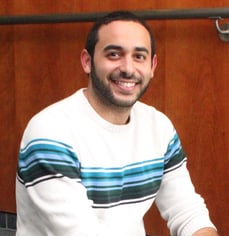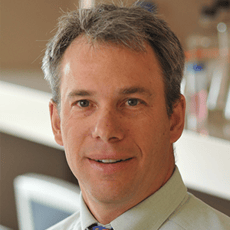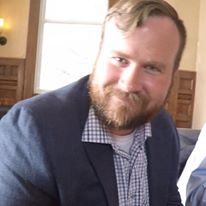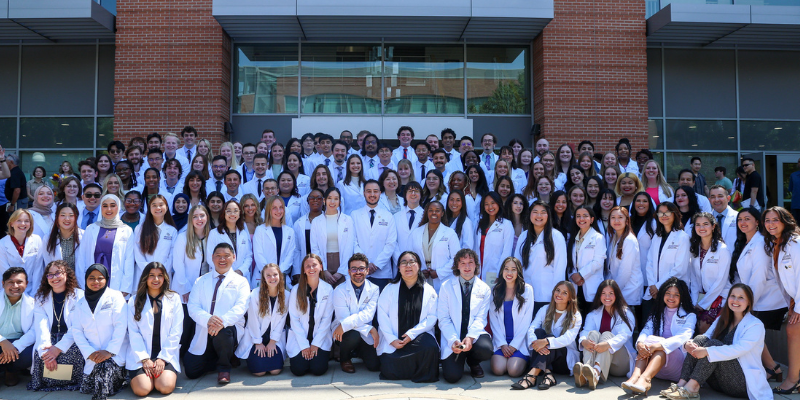Over the past year, despite its challenges, two University of Colorado Anschutz Medical Campus Skaggs School of Pharmacy and Pharmaceutical Sciences graduates excelled in their contribution to research. In recognition of their work, Mustafa Ibrahim, PhD, ’20, Clinical Pharmacology, and Colin Anderson, PhD, 20’ Toxicology, won the annual Harold C. Heim Award for Excellence in Research and Graduate Education. The distinction is accompanied by a $2000 cash award and was presented by Warren Heim, son of former Dean Harold C. Heim.
Ibrahim Sheds New Light on HIV Medication
 |
 |
| Alumnus Dr. Mustafa Ibrahim and faculty mentor, Dr. Peter Anderson, worked to re-evaluate PrEP, an HIV prevention medication. |
During his time at CU Pharmacy, Ibrahim worked under the direction of Dr. Peter Anderson at the The Colorado Antiviral Pharmacology Lab (CAVP) on campus. Peter Anderson, already world-renowned in HIV research, mentored Ibrahim in his previous work with pre-exposure prophylaxis (PrEP) and post-exposure prophylaxis (PEP) treatments.
Most notably, Peter Anderson’s work led to the development of a blood test for the effectiveness of the HIV prevention drug Truvada (a combination of tenofovir/emtricitabine), one of the drugs commonly known as PrEP. With the development of this test, researchers now know that when taken daily, PrEP is 99% effective at reducing the spread of HIV, a fact highlighted on the Centers for Disease Control and Prevention website.
Ibrahim’s task was to review and analyze an unsurmountable amount of patient data on Truvada and the blood spot adherence test, namely blood level concentrations of Truvada. And that, is when he discovered something interesting.
“I realized that Truvada is dependent on a patient’s weight,” he said. “Which means, that a smaller person might not have to take Truvada every day. Maybe they can take it every other day, or three times a week, and still maintain the blood concentration needed for it to be 99% effective.”
“He showed that Truvada was even more efficacious than we originally thought when he took weight into consideration,” said Peter Anderson.
More than 14,000 people are reported to be living with HIV or AIDS in the state of Colorado; a number which has been rising over the last five years. If PrEP does not need to be taken daily, it will break down another barrier to HIV and AIDS prevention. As one public health nurse commented, “this is a breakthrough. I work to prevent HIV in high-risk populations, and this would allow us to reach more people if we did not have to monitor daily adherence.”
Further study is needed to develop weight-based dosing guidelines. In the meantime, Ibrahim has been hard at work at AbbVie as a senior clinical pharmacologist, where he is applying the skills he learned at CU to support drug development programs. He is incredibly grateful for his time at CU under Peter Anderson, and the feeling is mutual.
“He was an all-around pleasure to have in the lab,” Peter Anderson said. “He was bright, highly motivated/productive, and a self-learner. He graciously gave of his time to help other students and faculty.”
“I think I speak for everyone who knew Mustafa when I say that we all will miss his patience, humility, and kindness.”
Anderson’s Research Could Impact Parkinson’s Treatment
 |
 |
| Alumnus Dr. Colin Anderson and his mentor, Dr. James Roede, explored a Parkinson's Disease toxicity model. |
Colin Anderson was recognized for his contribution to toxicology, specifically an agrochemical, maneb, commonly used in fungicides with impacts on Parkinson’s Disease. He worked under the direction of Dr. James Roede, Associate Director, Toxicology Graduate Program and a leading researcher at the CU School of Medicine's Linda Crnic Institute for Down Syndrome. Roede is most known for his work in basic cellular and molecular mechanisms of Down syndrome, but also works in cell neurotoxicity, hence his research on maneb.
Exposure to maneb is known to cause symptoms similar to Parkinson’s Disease and is an environmental risk factor to developing Parkinson’s. Colin Anderson worked with the maneb exposure model, which represents certain physiological and chemical aspects of Parkinson’s Disease observable characteristics, such as cell mitochondria dysfunction, metabolic stress, oxidative damage (an imbalance between free radical activity and antioxidant activity, leading to permanent fatty tissue, DNA, and protein damage), and eventually cell death.
Until this point, though the maneb model’s effects were known, how it occurred has not been effectively studied. Colin Anderson's research revealed direct protein modification by the fungicide maneb in cells. Further, he discovered that this interaction, created through disulfide bond formation, is the primary means of mitochondrial toxicity.
“The updated model of maneb’s toxic mechanisms will hopefully guide future research into targets for Parkinson’s Disease altering therapeutics,” he said. “It also contributes to the current foundational knowledge of the mechanisms of Parkinson’s Disease pathology.”
Though his work in Parkinson’s Disease changed an exposure model, he also was able to explore other interests.
According to Roede, Colin Anderson was instrumental in establishing the laboratory as experts in utilizing the Seahorse XFe96 extracellular flux analyzer from Agilent. The specific piece of lab equipment measures the oxygen consumption rate and extracellular acidification rate of live cells.
“His hard work in mastering the approach allowed the laboratory to engage in a multitude of collaborations, which boosted his publication count and secured him an exceptional postdoctoral fellowship opportunity,” Roede said.
Colin Anderson is especially thankful to Roede for taking a chance on an older student to mentor, and one who did not have a research background.
“Dr. Roede took a chance on me as an older student with a history in forensics, not research,” he said. “He gave me the appropriate amount of freedom, enough to feel independent yet he often had to refocus my attention when I strayed down the rabbit hole. I have a lot of respect for Dr. Roede and consider him a good friend. He was undoubtedly critical in forming my aspirations to seek a career in academia.”
After his graduation in December ’20, Colin Anderson is a post-doctoral fellow at the Buck Institute for Research on Aging in the San Francisco area, which administers a National Institutes of Health sponsored postdoctoral research training program in basic aging research and age-related disease. here, he is investigating therapeutics shown to suppress formation of mitochondrial oxidants.
“I would like to complete a successful post-doctoral project and apply for a career transition award to begin a professorship,” he said. “My family and I love the Denver area, and we left a lot of friends behind. We hope to return.”
He is always welcome.
“Colin was heavily involved in the Toxicology program throughout his time here,” said Roede, “and was a huge factor in improving the program and improving the student experience.”



